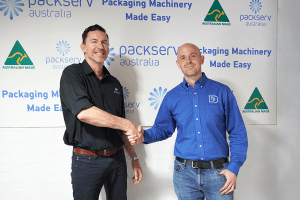Reinventing a brand is not easy, let alone doing so for three separate brands that are already deeply entrenched in the Aussie food-scape, and no company is more aware of this than Kellogg.
Pringles, Nutri-Grain and Special K all shared one similarity, despite being extremely long-standing Australian brands, none were engaging strongly enough with millennials or teens.
Previous campaigns for each had been so impactful in older generations that Kellogg's was fighting a battle against itself and for the brand's marketing director, Tamara Howe, the only way forward was change.
Speaking at Future Unpacked, the Food & Drink Business + PKN L!VE event in Sydney last week, Howe addressed the three different strategies implement by the Kellogg's brand that drove not only awareness in the younger demographics, but a lift in popularity.
The first was Pringles. Having bought the brand back, Kellogg's was facing sourcing issues, and not long after the purchase, moved its sourcing from the US to Asia, a decision that was met with criticism.
“Loyal consumers were not happy we changed the food, we had negative feedback on social media and disappointed customers,” Howe says.
She acknowledged it wasn't just changing source of Pringles which was causing a ripple effect, admitting the snack-food had “random” social media activity that offered little to consumers.
“We knew we were facing the 'before' of Pringles, the point was how do we get to the 'after', and how do we create positive social sentiment?,” she says.
In the end, the task was simple: specifically track down 'haters' and ask for their address. From here, Kellogg's created a “VIP Pringles group” consisting only of those who had criticised the brand.
Next up, the company sent out special, individualised Pringles to the VIPs. The results? Howe says the company saw an immediate change and swing in sentiment on its social community.
“We turned haters into advocates. We singled-out disappointed consumers and turned them into passionate supporters,” Howe says.
Nutri-Grain was next on the list. The strategy for this reinvention had to be a little more thorough than Pringles. The idea was to reconnect with the country's youth, specifically teen boys who Howe says were particularly hard to engage with.
“We used YouTube to tell long-form great story telling about bringing the brand values to life; courage, strength and determination, and then shorter stories for our TVCs.”
Kellogg's created a series of commercials, each featuring a different Aussie hero. The first centred on the success of blind, world-famous surfer Derek Rabelo. The next told the story of award-winning paraplegic FMX rider, Andy Hensel. Lastly, Nathan Charles, a professional rugby player with cystic fibrosis was given the spotlight.
The campaign saw a rise in popularity with teen boys because of the relevant content, and Howe noted even mums were getting back on the Nutri-Grain train, as the demo were seeing the ads on TV and then heading to YouTube to watch the longer stories.
The final brand on the hit-list, which Howe says had the biggest mountain to climb was Special K. Where the Pringles and Nutri-Grain were simply building on their brands, the challenge for Special K was to redefine its image altogether.
“It was time to put our money where our mouth was. We were looking to show Special K as food that helps women live healthy lives,” Howe says.
“While for so long the brand had dominant associations with dieting, bikinis and red skirts, our job was to evolve the brand and make it more relevant to modern women of today,” she adds.
Howe saw an opportunity in aligning the brand with the upcoming AFL Women's League, and Kellogg's immediately jumped on board.
“I knew we, as a country, were on the brink of a huge shift in Australian culture in terms of female sports,” Howe says.
The multichannel sponsorship ran across social media, in-game activations, media campaigns and boosts from the player's own social accounts.
“Our idea was to show how strong feeds strong. Strong food supports strong women, strong women support each other.”
For Howe, partnering with Women's AFL was the best brand decision Special K has ever made, and the outcomes exceeded every expectation.
The campaign drew in more attention than NAB, a larger sponsor who had invested more money into the game, as 73 per cent of people asked thought it was an “appropriate” partnership which furthered both the brand's popularity and the game's success.
As well as this, social media sentiment has been continually positive and constantly growing.
Howe said the company couldn't be happier with the way Special K has grown as a result of the sponsorship.
“Finally we are now starting to move away from the diet image of small skirts and bodies, to one of health and well-being. Previously we were about empty calories, now we fuel performance.”





